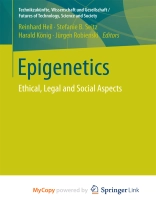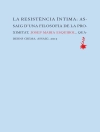Modern epigenetics unites scientists from life sciences, organic chemistry as well as computer and engineering sciences to find an answer to the question of how environmental influences can have a lasting effect on gene expression, maybe even into the next generations. This volume examines from an interdisciplinary perspective the ethical, legal and social aspects of epigenetics.
Inhaltsverzeichnis
Introduction.- Introduction to Epigenetics.- Too Early or Too Late? The Assessment of Emerging Technology.- Epigenetics and Genetic Determinism (in Popular Science).- Identity and Non-Identity. Intergenerational Justice as a Topic of an Ethics of Epigenetics.- Genetics, Epigenetics and Forms of Action. About the Ethical Ambivalence of Epigenetic Knowledge.- Epigenetics: Biological, Medical, Social, and Ethical Challenges.- Learning from and Shaping the Public Discourse about Epigenetics.- State of the Public Discourse on Epigenetics.- Epigenetics – New Aspects of Chemicals Policy.- Epigenetics and Legal Regulations: A challenge for the State’s Obligation to Protect Environment, Individual’s Health and Civil Rights.- Epigenetics and the Protection of Personality Rights.- Adam’s Apple and His Legacy: Ethical Perspectives on Epigenetics with an Excursion to the Field of Body Weight Regulation.- Epigenetics and Original Sin. Theological-Ethical Reflections on Heredity and Responsibility.
Über den Autor
Reinhard Heil and
Harald König are researchers at the Karlsruhe Institute of Technology.
Stefanie B. Seitz was a researcher at the Karlsruhe Institute of Technology until January 2016 and is currently working for the DBFZ – Deutsches Biomasseforschungszentrum g Gmb H, Leipzig.
Jürgen Robienski is a German lawyer in Hannover and Müden/Aller (Lower Saxony). He is a research fellow at the Center of Ethics and Law in the Life Sciences (CELLS) of Leibniz University in Hannover.












